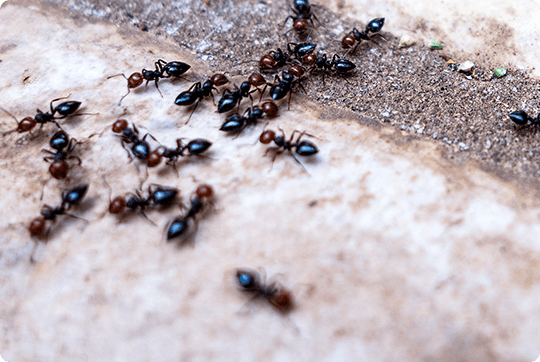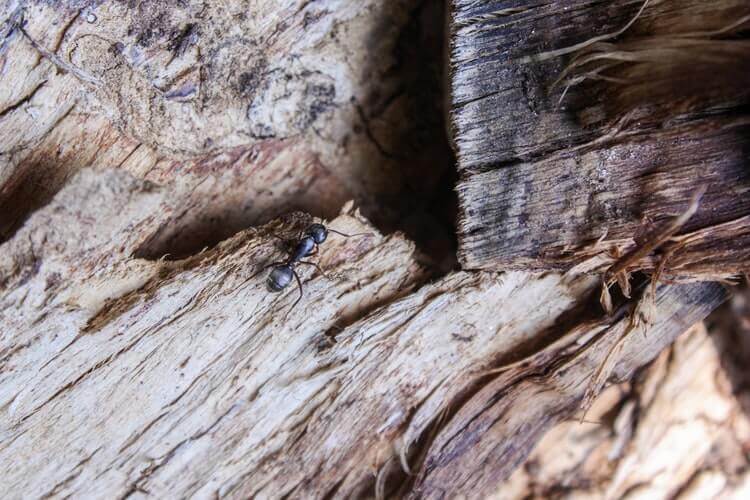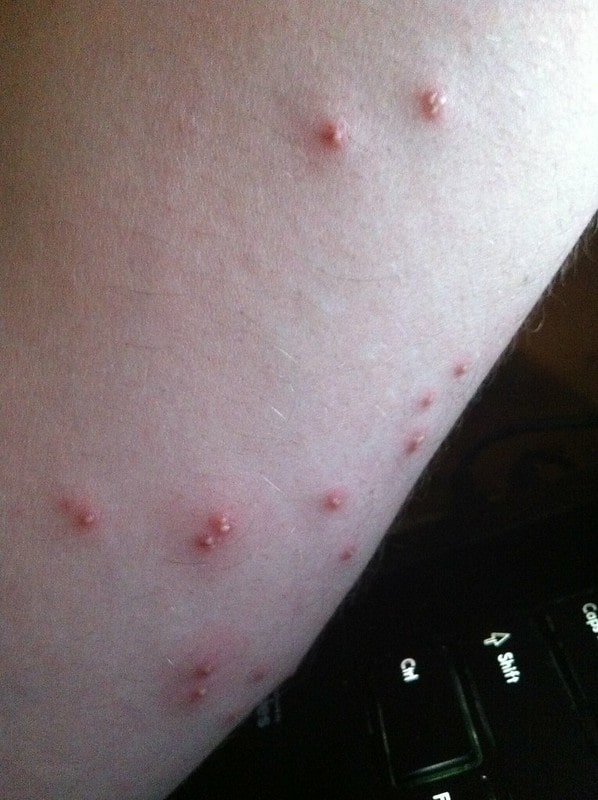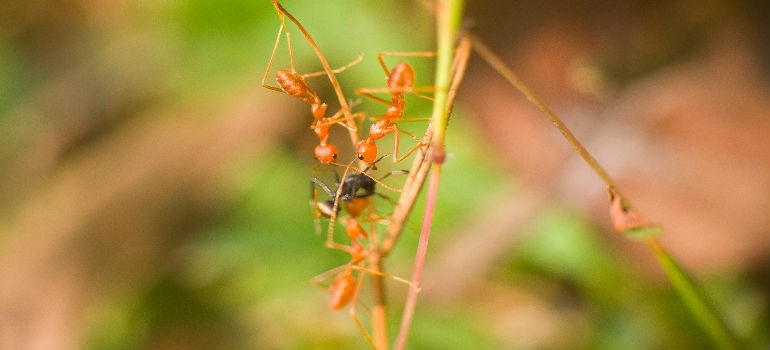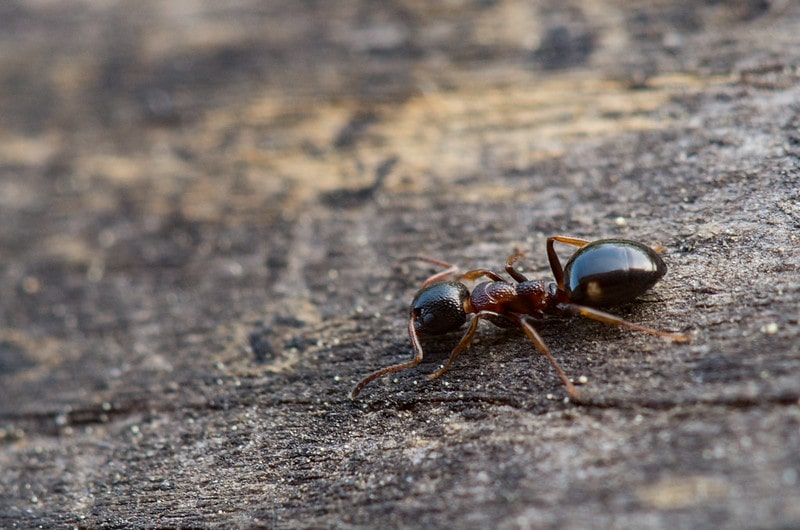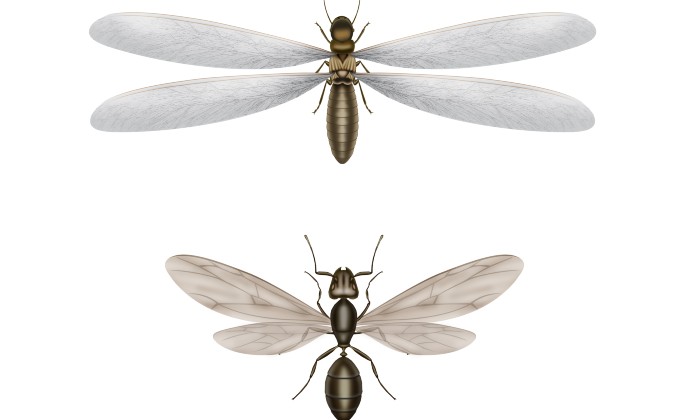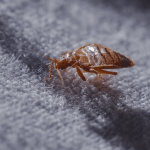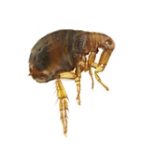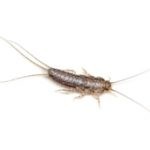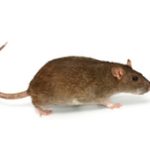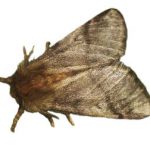What Do Ants Eat?
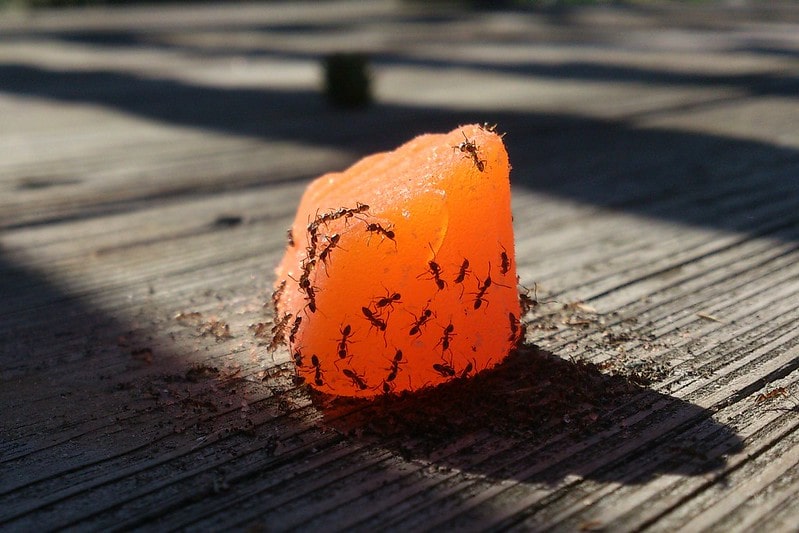
Image by: ryaninc / License: CC BY 2.0
Ants in the UK are among the most resourceful insects, capable of consuming a wide range of foods depending on their species and environment. Opportunistic feeders with diverse diets, ants eating everything from sugary nectar to protein-rich insects.
Understanding what attracts ants to your home can help manage infestations while respecting their role in nature. Whether in gardens or the wild, British ants continue to thrive by adapting to available food sources.
What food attracts ants the most?
Ants are omnivores with a diverse diet that includes sugary substances like nectar, fruits, and honeydew, as well as plants, seeds, and even other insects. Some species, like fire ants, are known to consume meat, including dead animals, while leaf-cutter ants rely on fungus grown from plant material. Ants are efficient foragers, constantly searching for food to sustain their colonies.
Sugar and Sweets
Sugary substances are the primary attractant for many ant species, particularly garden ants (Lasius niger) and pharaoh ants (Monomorium pharaonis). These foods provide a quick energy source:
- Honey and syrup – High in natural sugars, making them irresistible to ants.
- Soft drinks and juices – Spilled sugary beverages quickly attract foraging ants.
- Fruit and fruit juice – Overripe fruits, especially bananas, oranges, and apples, release natural sugars that draw ants. If you spill a drop from your jam and don’t wipe it, keep in mind that ants can sense it from a long distance and come to your kitchen immediately.
- Sugar granules and candy – Any exposed sugar source, including sweets, cakes, and biscuits, can lead to an ant invasion.
Protein-Based Foods
Many UK ant species require protein, especially when feeding their larvae. Foods rich in protein include:
- Meat scraps – Leftover chicken, beef, or fish attract scavenging ants.
- Dead insects – Ants naturally prey on or scavenge dead insects for protein. Like people, there are meat lovers among ants. Such is the fire ants which are omnivorous and can feed on meat, plants and sugary food. They love greasy food and insects or worms can provide it. Fire ants can eat dead animals, as well. They can eat spiders, ticks, even birds and rodents.
- Pet food – Dry or wet cat and dog food is a common target for ants, especially if left out overnight.
- Eggs and dairy products – Some ants, such as carpenter ants, are attracted to protein-rich food sources like cheese and eggs.
Fatty and Greasy Foods
Grease-loving ants, such as pavement ants (Tetramorium caespitum), are drawn to fatty foods, including:
- Cooking oil and grease spills – Residues from frying pans and food preparation.
- Butter and margarine – Uncovered dairy fats can attract ants.
- Nuts and peanut butter – High-fat, protein-rich food sources that ants love.
Bread and Carbohydrates
Although ants in the UK primarily seek sugars and proteins, some species consume carbohydrates found in:
- Bread crumbs and baked goods – Any exposed carbohydrates provide a food source.
- Rice and pasta – Leftover grains or cooked starches can attract ants.
- Cereal and granola – Sugary, grain-based snacks often appeal to ants.
Plants, Seeds, Grains
Certain types of ants are vegan. They look for seeds, grains, plants, leaves and other greenery. They even grow fungus out of the leaves. The leaf-cutter ants are known for their ability to be gardeners. They cut sections of leaves, flowers or grass, take it to their nests and don’t eat it. Instead, these ants clear the garbage and decay. Leaves act as a fertilizer to grow fungus which ants larvae feed on.
Sugary, protein-rich, and greasy foods are the biggest attractants for ants. By managing food storage and cleanliness, you can reduce the risk of ant infestations while understanding their foraging behaviour.
Ants eating ants
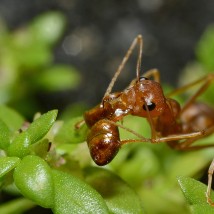
Believe it or not, ants can be cannibalistic. Army ants are known for invading the nests of other ants where they look for eggs and young ants to eat. In other cases, when the queen is endangered from lacking food sources, she can eat her offspring.
Certain ant species, such as army ants or fire ants, are known to be aggressive and may attack and consume other ants, especially from rival colonies. These ants often have a protein-based diet, and other ants provide an easy food source.
Also, ants may scavenge the bodies of dead ants. This is more common in species that rely on scavenging for food, such as carpenter ants or pavement ants. They may feed on the bodies of fallen ants, which provide them with necessary nutrients.
How ants locate food sources
Ants are exceptional foragers, and they have developed several methods for locating food sources. Their ability to find food is central to their survival and their role in the ecosystem. Here’s how ants locate food:
- Pheromone trails – Ants primarily rely on pheromones, which are chemical signals, to communicate and guide other ants to food sources. When a foraging ant finds food, it releases a trail of pheromones leading back to the nest. Other ants pick up the scent and follow the trail to the food source. The stronger the pheromone trail, the more ants will follow it. This process is crucial for efficiently gathering food for the colony.
- Visual and environmental cues – While pheromones are the most common way ants find food, they also use visual cues and environmental markers to locate food sources. Some species may rely on landmarks such as rocks, plants, or objects in their environment to help them navigate back to a food source.
- Memory and navigation – Ants have the ability to remember specific locations and pathways that lead to food. They can use visual landmarks and landmarks in the landscape to guide them. This ability allows ants to travel more efficiently to a food source, especially in more complex environments where pheromone trails might not always be available.
- Detection of food – Ants have highly developed sense of smell that help them detect food through chemical cues. They can sense the presence of food such as sugars, proteins, or other organic compounds. For example, ants are particularly sensitive to sweet scents, which is why they are often attracted to sugary foods.
- Following other ants – Ants can also follow the trails left by other ants to locate food. If an ant encounters another ant coming from the direction of a food source, it may decide to follow it, hoping to find the source as well. Ant colonies often have a highly organised division of labour. Once a foraging ant locates a food source, it may recruit other ants to assist with gathering and transporting the food. This cooperative approach ensures that the food is efficiently collected and returned to the colony.
- Vibrations and sounds – Some ants are known to use vibrations or sounds to communicate with each other while foraging. This method is less common than pheromone use, but it can be helpful in environments where visual cues or pheromones are not as effective.
Ants are equipped with the so-called mandibles (jaws). They are used for cutting, holding, digging, hunting, food processing. They help ants to lift any food crumbs left and salivate them so that they can easily consume them.
Furthermore, ants have antennae which are one of the most important parts of their body. Thanks to the antennae, ants can smell, touch, feel any object and support them to find food sources and communicate with each other.
Worker ants, the ones we can mostly see, have two stomachs. The first one is called mesosoma and has the function of storage where ants keep the food and when they come back to the nest, they will vomit the food to feed the rest of the colony.
What attracts ants besides food?
- Water – As any other creature, ants need water. For that reason, they will search for water and build their nest. If your garden experiences drought, the colony will head to your property to search for accessible water. So, the most common places ants can hang around are kitchens or bathroom sinks where any standing water can be formed.
- Nesting places – Usually, ants build their nests underground where it’s safe and offers perfect conditions for settling their colony down. Anyway, some might be nesting behind or under your appliances, wall cavities, under floorboards or behind wallpapers.
- Warmth – Ants are cold-blooded insects, meaning they are sensitive to temperature. They tend to seek out warmth, especially during colder months. Warm environments, such as heated buildings, or sunlit areas in the garden, can attract ants as they search for warmth to maintain their colony’s optimal temperature.
- Pesticides usage – Sometimes when you apply certain types of pesticides in your garden, it can repel ants. Then, the whole colony will move to your house where no chemicals threaten them.
- Plants – Ants can use some plants, trees or bushes as a connection from the garden to your house. For example, there might be a branch very close to the kitchen window. Ants will use it to easily get to your home. Additionally, many plants produce nectar which is highly attractive to ants. Clover, Buttercup, Maple and Pine trees often host aphids that secrete honeydew, drawing ants.
- Pheromone trails and other ants – As we mentioned above ants communicate primarily through pheromones. When one ant finds a food source or a nesting site, it leaves a pheromone trail that guides other ants to the same location. These trails can attract large numbers of ants. Ants are social insects, and they are attracted to the presence of other ants, especially if they are from the same colony.
- Other insects – Some species of ants in the UK are attracted to or depend on other insects for food or shelter. For example, aphids and other sap-sucking insects secrete a sugary substance called honeydew, which is highly attractive to ants. Ants will protect these insects from predators in exchange for access to honeydew.
- Decomposing organic matter – Certain ants, especially scavengers, are attracted to decomposing organic matter. This includes dead animals, rotting food, or decaying plant material. The scent of decomposition can draw ants from a distance as they search for protein and nutrients.
- Light – While ants do not rely heavily on light, some species are attracted to certain light sources, particularly at night. This is especially true for flying ants during mating seasons, where light sources like porch lights or streetlights can attract swarming ants.
How do ants get in the house?
Ants are remarkably resourceful when it comes to finding their way into your home. They can enter through the smallest of openings, making them a persistent problem. The most common entry points ants can use to enter your house are:
- Wall cracks: Ants often enter through cracks in walls, foundations, or windows. Even the tiniest fissures can provide a route for them to access indoor spaces. Over time, ants may establish regular pathways leading to food sources inside the house.
- Windows and doors: Obviously these are very common ants entry points. If you leave them open, don’t be surprised why ants are in your house. Improperly sealed doors and windows can be a major entry point for ants. Gaps around window frames, door seals, or worn-out weather stripping can create easy access.
- Plumbing and electrical lines: Ants can follow plumbing and electrical lines that enter the home. These provide hidden entry points that are difficult to detect. Leaky pipes or vents can act as conduits for ants to enter your house.
- Gaps in the foundation: During the construction, there might be very small gaps left from where ants will easily find their way to your kitchen.
- Floor: Certain types of ants can burrow into wooden materials where they create routes.
- Potted plants: Sometimes when you bring plants inside your house, you might’ve brought ants, as well. They usually hide under leaves so they get out of your sight. This is common during the warmer months, as ants seek new environments to colonise.
To prevent ants in your house, it’s essential to seal potential entry points. Regularly check for cracks in walls, around windows, and under doors. Keep the kitchen clean and wipe food spills to reduce the likelihood of attracting ants. Additionally, consider using natural ant repellents or calling ant exterminator for more extensive infestations.
How to get rid of ants in the house
Ant infestations can be frustrating, but with the right strategies, you can effectively eliminate them from your home. You can start with some natural ant repellents before using chemicals:
- Boric acid: It destroys the ant’s exoskeleton and internal organs. Mix the boric acid, sugar, and water together until the sugar dissolves. Then, soak cotton balls in the solution or place it on small pieces of paper or cardboard. Place the bait near ant trails, nests, or areas where ants are active. You can also use boric acid directly as a powder to create a barrier or to target nests. Sprinkle a thin layer of boric acid powder in areas where ants are active, such as along baseboards, near cracks, or entry points. The slow-acting nature of boric acid allows ants to carry the bait back to the colony, ensuring that the queen ant and other ants are exposed to the poison. Use it away from pets and children, as boric acid can be toxic if consumed in large quantities.
- Vinegar: A mixture of equal parts vinegar and water can be sprayed along ant trails and entry points. The strong scent disrupts their pheromone trails.
- Diatomaceous Earth: This fine powder is harmless to humans and pets but lethal to ants. Sprinkle it around areas where ants are present, and it will dehydrate and kill them.
- Cinnamon: Ants dislike cinnamon. Sprinkle it around entry points or make a cinnamon oil spray to deter ants from entering.
- Salt: Salt is often used as a natural deterrent for ants. Sprinkle salt around entry points, ant trails, or nests to discourage ants from entering areas. This works because salt can disrupt the ants’ natural ability to communicate using pheromones and can cause dehydration.
- Talcum powder: Ants dislike the texture and feel of talcum powder, which disrupts their ability to follow their pheromone trails. Sprinkling talcum powder around entry points, along ant trails, or in areas where ants are frequently seen can act as a natural deterrent. However, while talcum powder may repel ants temporarily, it may not be a long-term solution for larger infestations. For more persistent problems, combining it with other control methods, such as ant baits or sealing entry points, can be more effective.
- Lemons: Work as a deterrent but cannot kill the ants. Squeeze fresh lemon juice onto ant trails, entry points, or areas where ants are active. You can also dilute the juice with water and spray it where you see ants.
- Essential oils: Some well-known and useful oils are peppermint, tea tree or citrus oil. They are very effective after you’ve treated an infestation and you keep finding lone ants or small clusters of them. Peppermint oil is one of the most powerful essential oils for repelling ants. The strong menthol scent disrupts ants’ communication and acts as a natural deterrent. Mix 10–20 drops of peppermint oil with water in a spray bottle and apply it to areas where ants are entering or active. You can also soak cotton balls in essential oils and place them near ant entry points or nests to create a barrier that ants will avoid.
- Set traps and ant baits: Liquid ant baits are highly effective due to their easy-to-absorb nature. They contain a mixture of attractant food and poison. Worker ants are drawn to the liquid and carry it back to the colony, killing the queen and other ants. Gel baits offer a convenient, less-messy solution to ant control. The gel can be applied directly to areas where ants are active, and it attracts ants who then carry the poison back to the colony.
If nothing helps, you can try some powerful insecticides. It is easy to find commercial ant repellents, such as sprays and powders. Ants are killed instantly and future infestations are prevented with these products. For long-lasting protection, apply them around baseboards, windows, and doors.
In conclusion
Ants can eat almost anything from sweet fruit, meat, and plants in the garden. There are different types of ants that have their own diet but whatever it is, you will most certainly be invaded by them to some point.
Make your home less attractive to ants by maintain high hygiene. Clean regularly with vacuum, and don’t leave food on tables or countertops. If you drop food crumbs, always sweep them and use ant-proof food containers. Trim trees and bushes in your garden so that ants won’t use the branches of the trees as a trail to your house.
If you’ve noticed any dead insects somewhere in your home, make sure you get rid of them, as ants might sense them and find their way to the victim. Check if you have any water leakages and make sure you stop them so that standing water won’t form. Make sure you mop your bathroom regularly. Wipe the countertops with solution of water and white vinegar.
We distribute educational information according to the experience and professional knowledge of the pest technicians. However, we don’t provide any medical advice.



